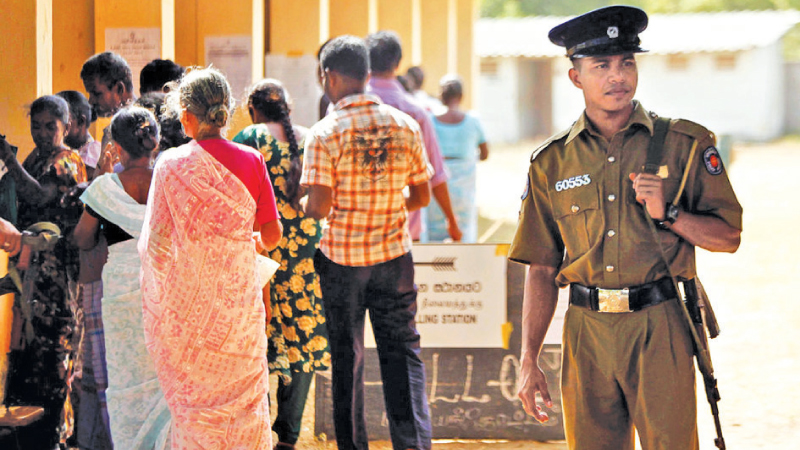Abraham Lincoln born in a log cabin collecting law notes in a barrel became a lawyer and went on to become one of the best American Presidents famously saying in his Gettysburg Address marking the high point of American eloquence that democracy is government by, for and of the people.
Sir Winston Churchill, who went to university and came back home, not liking to learn compulsory Latin and became a historian of no mean repute, adding a rider to it wittily said democracy is the best of the worst forms of government.
Plato’s concept of philosopher king denotes that rulers have to come from the meritocracy. According to Collins Concise Dictionary, Third Edition, meritocracy is ruled by persons chosen for their superior talents or intellect; persons constituting such a group; or a social system formed on such a basis.
Kesaralal Gunasekera, former Member of Parliament and one time Chairman, Associated Newspapers of Ceylon Ltd., very significantly said at a TV talk show recently that eighty per cent of those in Parliament today cannot go to their areas seeking re-election. 
It is not recently that the rot set in but decades ago when not only the Napoleonic concept of ‘careers open to talent’ was abandoned but graft emerged, Prime Minister S.W.R.D. Bandaranaike had to punish at least four MPs of his own party for bribery taking away their civic rights; mind you for the first and the last time.
The taking of bribes re-surfaced in the early 1970s when a politician in the coalition government in which surprisingly there were Leftist parties took Rs. 2,000 to admit students to a Colombo school. This was repeated at the end of the 1980 decade in which Rs. 5,000 was taken by a politician, through a clerk who not long thereafter died of drinking, to take in children to the same school.
Prime Minister S.W.R.D. Bandaranaike, the philosopher king, also made sure that MPs were sober at least when they were in the Parliament Chamber by closing the liquor bar in the House. However, it was opened again though at a different location at the other end of Galle Face Green, after the Prime Minister was assassinated and in an amusing incident, thereafter when a minister from the upcountry known to be a tippler walked up to J.R. Jayewardene tried to comb his hair!
J.R. Jayewardene, then in the Opposition who did not easily get ruffled could not help but get up and tell Prime Minister Sirimavo Bandaranaike, “Madam Prime Minister it was alright for you to open the liquor bar closed by your saintly husband but make sure you don’t stock kasippu in it!” Even during the days of the 1960-1970 Government at least two ministers were seen in a state of inebriation dozing off keeping their heads on the desk, not long after 10:00 a.m. the opening time of Parliament then.
Mercifully, there were no allegations as to epicurean extravagance at the Parliament canteen then where the only incident known was the serving of a glass of milk to Prime Minister S.W.R.D. Bandaranaike, his not taking it saying that he had a glass of orange juice at home just before he left and Minister and Leader of the House C.P.de Silva drinking it and being rushed to England to save his life as the milk was laced with poison.
President J.R. Jayewardene made sure that food served in Parliament was a meal fit for philosophers, consisting of red raw rice served on a soup plate with a chunk of kelawalla fish and low country village vegetable curries such as kohila, kebella and thumba dalu embula, kiri ala etc., brought from the then Oberoi Hotel at Rs. 5 and a desert of ice cream for another Rs. 5.
After J.R. Jayewardene all this changed and food began to be cooked at the Parliament kitchen itself the canteen serving a buffet meal consisting of samba rice, red raw rice, fried rice, several vegetable curries, fish, chicken, beef and pork etc. and a desert of yogurt and caramel pudding only for around a couple of rupees!
It is natural for anyone to consume a variety of food items as it is served at a minimal price disregarding the axiom, ‘unless food is taken as a medicine to serve the purpose of nutrition only when young it will be necessary to take medicine as food in old age’. It is also some of those with intellect, who observe this rule coming within the twenty per cent in Parliament comprising the meritocracy fit to serve the people very well.
Although democracy has deteriorated in the country, eighty per cent of Parliamentarians are not certain of being able to get re-elected, totalitarianism, definitely, is not the answer to it. It would be like ‘taking pepper for ginger’. It is in this context that the rule by the meritocracy of persons chosen for their superior talents or intellect becomes relevant.
If anyone tries to come to power through the suffering of the people caused by the admitted economic mismanagement of the Government, to which Prime Minister Ranil Wickremesinghe, using his stature in the international community, is in the process of finding solutions. This is definitely not the time for Opposition political parties to make desperate attempts to find shortcuts to power.
It is evident that the country has a large floating vote as seen from the election results of 1956, 1970, 1977 and more recent times, so it is possible for any party or combination of parties to come to power and form a strong government if it can be proved or shown that they can deliver the goods.



Add new comment